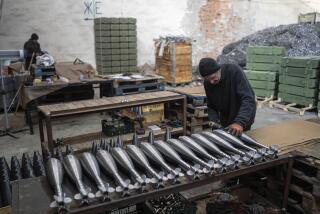Japan’s Arms Makers Flex Their Muscles : Giant Industrial Firms Quietly Planning to Step Up Production
TOKYO — Flouting one of postwar Japan’s biggest taboos, some Japanese companies have begun talking openly about expanding their sales of weapons.
The fastest growth by the defense industry since World War II and recent demands by the United States that Japan spends more on its military have combined to draw arms makers into the daylight.
Nissan Motor, known throughout the world as an auto maker, will ask its shareholders Wednesday to approve a change in the company’s articles of incorporation, acknowledging for the first time that it makes weapons, a company spokeswoman said. The automotive giant has been manufacturing military hardware for the last 34 years.
“The reason we changed our articles of incorporation,” she said, “is because we think that national defense is very important. Work for the Defense Agency has been increasing, and we are going to accept more work in the future.”
In sales terms, Nissan does not even rank among the top 20 contractors to Japan’s Defense Agency, but analysts said the company’s move was typical of a trend among weapons makers to become more open about their trade.
“A few years ago, you would visit companies and they would not even discuss their defense business,” said Stephen Marvin, analyst at Jardine Fleming (Securities) in Tokyo. “Now, the reticence toward defense is clearly receding very rapidly. They talk about it as a viable growth sector.”
Ishikawajima-Harima Heavy Industries changed its articles of incorporation to include the word “weapon” in June, 1987, a company spokesman said. It has long been one of the Defense Agency’s top 10 military contractors, an agency spokesman said. The leading shipbuilder and heavy machinery maker boasts a 70% Japanese market share in jet engines.
Increases Planned
The general manager of the weapons-making section of Mitsubishi Heavy Industries, Takaaki Yamada, said he hoped to increase the size of his division to account for one-third or at least one-quarter of the whole company’s sales. Mitsubishi is already the largest of the Japanese defense contractors.
In the year ended last March 31, Mitsubishi’s aerospace and special vehicle division, which Yamada manages, claimed just 18.3% of the company’s sales.
Kawasaki Heavy Industries, Japan’s second-biggest military goods merchant, wants to increase its defense-related production by 1% or 2% of total sales in the current year, ending March 31, 1989, a company spokesman said. Last year, 20% to 25% of Kawasaki’s 579.73 billion yen ($4.5 billion) in sales were in defense-related equipment, the spokesman said.
On June 23, the company said it was considering bidding for a role in a part of the U.S. “Star Wars” space defense system.
A spokesman for Fuji Heavy Industries, the No. 8 government defense contractor, said his company hoped that aircraft will account for 10% of total annual sales in five years, up from 5% in the year ended March 31, 1988. About 80% of the aircraft are destined for the Air Self-Defense Force, the spokesman said.
Brought to its knees by conquering American armies and two atomic bombs, Japan adopted a constitution at the end of World War II forbidding it from waging war except for self-defense.
But recently, military spending has been rising steadily. In December, 1986, the government decided to let its defense budget exceed 1% of gross national product, a self-imposed limit sealed in 1976.
In the 1988-89 fiscal year, defense spending has been provisionally set at 3.700 trillion yen ($28.9 billion), Japan’s biggest military budget since the war.
Washington called on Japan earlier this year for increased military spending to take some of the financial burden for the country’s protection off America’s shoulders.
Yamada said: “Against this background, rather than welcoming (higher military spending) we see it as our duty.”
Marvin said extensive media coverage of the U.S. demands and the defense budget expansion had made the issue of Japan’s growing arsenal less sensitive.
The defense industry was a subject of speculation on the Tokyo stock market at the beginning of June.
One stockbroker at a major securities house said the strength of Japan’s military should be more in line with the country’s position as the world’s No. 2 economic power.
But some companies are still reluctant to talk about weapons. A spokesman for Toshiba, the fifth-biggest arms contractor, declined to comment on his company’s plans.
“It is a very sensitive issue,” he said.
A government poll conducted in January showed that 80% of Japanese opposed further expansion of military spending.
More to Read
Inside the business of entertainment
The Wide Shot brings you news, analysis and insights on everything from streaming wars to production — and what it all means for the future.
You may occasionally receive promotional content from the Los Angeles Times.










